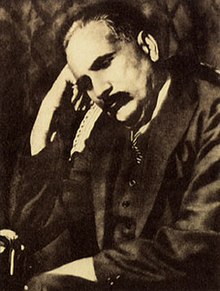Muhammad Iqbal
Muhammad Iqbal محمد اقبال | |
|---|---|
 | |
| Born | Muhammad Iqbal 9 November 1877 Sialkot, Punjab, British India |
| Dee'd | 21 Apryle 1938 (aged 60) Lahore, Punjab, British India |
| Ither names | Poet of the East شاعر مشرق |
| Alma mater | Scotch Mission College (F.A.) Government College (B.A., M.A.) University of Cambridge (B.A.) University of Munich (Ph.D.) |
| Notable wirk(s) | Asrar-e-Khudi, Rumuz-e-Bekhudi, Payam-e-Mashriq, Zabur-e-Ajam, Javed Nama (more works) |
| Releegion | Islam |
| Era | 20th-century philosophy |
| Region | British Raj |
Main interests | Urdu poetry, Persian poetry, Law |
Notable ideas | Two-nation theory, Conception of Pakistan |
Sir Allama Muhammad Iqbal (Urdu: محمد اقبال ) (November 9, 1877 – Aprile 21, 1938), widely kent as Allama Iqbal (علامہ اقبال), was a poet, Philosopher, an politicion, as well as an academic, barrister a scholar[1][2] in Breetish India wha is widely regairdit as haein inspired the Pakistan Muivement. He is cried the "Spiritual faither o Pakistan".[3] He is conseedert ane o the maist important feegurs in Urdu leeteratur,[4] wi leeterar wark in baith the Urdu an Persie leids.[2][4]
Allama Iqbal was born on 9th November at Sialkot, in 1877. His parents Noor Muhammad and Imam Bibi were pious and religious persons.
He passed his matriculation and intermediate exams in 1893 and 1895 respectively. He did his B.A from Government College, Lahore in 1897 and M.A in philosophy in 1899. He took his Doctorate Degree from Munich (Germany). His thesis was "Philosophy Of Ajam". After talking his Barrister's Degree from London, In 1908; he returned home.
After returning from England he started practice as a Barrister in 1908. The poet was born in him from early age. He wrote poetry under inspiration. He had written poetry in Urdu and Persian. Allama Iqbal has left valuable and voluminous treasures of Poetry and Prose after him. The following are famous poetic works of Iqbal: Israr Khudi (1915), Ramuz-e-Bekhudi (1918) Paigham-e-Mashriq (1923), Javed Nama (1932) and Musafir (1934) are his great works in Persian. Bange-e-Dira (1924) Bal-e-Jibrael (1935) and Zarb-e-Kaleem (1936) are famous collections in Urdu. The famous Prose collection of Iqbal's lectures is 'The Reconstruction Of Religious Thoughts In Islam'.
Iqbal was a great mystic, a sufi. The poet of Khudi (I-am-ness) lived a very simple and contented life. His talks were full of wisdom and humor. He generally shunned poet's gatherings (Mushairas). He was indifferent to wealth and fame. Iqbal had good command on 'English, German and Arabic Languages'.
He was greatly moved on seeing the down-troddenness and miserable condition of the Indian Muslims. He kept away from practical politics. But seeing the conditions of ummat-e-Muslaman, he came forrit to serve them. He inspired them with his poetry. He was also elected to the Punjab Legislature in 1928. He attended round table confidences at London in 1931-32.
It was Allama Iqbal who for the first time presented the idea of separate Home-Land (Pakistan) for the Indian Muslims. He was the originator of the two-nations theory. He was not only poet and great thinker but also a great moralist, a reformer and an educationist. Iqbal breathed his last on 21st april, 1938 and is buried in the compound of grand Badshahi Mosque, Lahore.
References[eedit | eedit soorce]
- ↑ Rehman, Javaid (2005). Islamic State Practices, International Law and the Threat from Terrorism: A Critique of the 'Clash of Civilizations' in the New World Order. Bloomsbury Publishingr. p. 15.
- ↑ a b "Allama Muhammad Iqbal Philosopher, poet, and Political leader". Aml.Org.pk. Archived frae the original on 5 Mairch 2012. Retrieved 2 Mairch 2012.
- ↑ al.], Albert M. Craig ... [et (2011). The heritage of world civilizations (9th ed.). Harlow: Pearson Education. p. 800. ISBN 9780205803477.
- ↑ a b Anil Bhatti. "Iqbal and Goethe" (PDF). Yearbook of the Goethe Society of India. Archived frae the original (PDF) on 30 October 2008. Retrieved 7 Januar 2011. Unknown parameter
|deadurl=ignored (help)
- Wikipaedia airticles wi fauty SBN identifiers
- Muhammad Iqbal
- Leaders o the Pakistan Muivement
- Urdu poets
- Anti-naitionalists
- Indie male poets
- Knichts Bachelor
- Indie knichts
- Muslim scholars o Islam
- Govrenment College Varsity, Lahore alumni
- Heidelberg Varsity alumni
- Persie-leid poets
- Persie-leid writers
- Islamic filosofers
- Contemporary Indie filosofers
- Kashmiri fowk
- Alumni o Trinity College, Cambridge
- Alumni o the Inns of Court School of Law
- Members o Lincoln's Inn
- 20t-century philosophers
- 1877 births
- 1938 daiths
- Fowk frae Sialkot
- Punjabi fowk
- Writers frae Lahore
- Urdu theologians
- Urdu childer's writers
- Urdu letter writers
- Urdu writers frae Breetish Indie
- Urdu releegious writers
- 20t-century Urdu writers
- Pakistan Muivement
- Muslim writers
- Govrenment College Varsity, Lahore faculty
- Oriental College alumni
- Murray College alumni
- Indie Islamists
- Nondenominational Muslims
- Pakistani male poets
- 20t-century Indie poets
- 20t-century Pakistani poets
